WESTERN CAPE SHUTDOWN
Incentive payments to taxi associations suspended in bid to quell minibus transport war
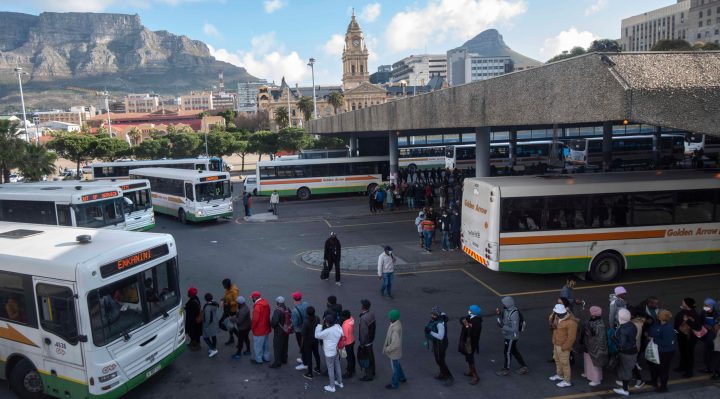
‘We cannot allow a group of thugs to continue to threaten the lives of our residents and to commit what is a clear act of economic sabotage by preventing people from getting to work,’ said Premier Alan Winde.
Incentive payments to taxi associations Cata and Codeta have been suspended in an attempt to quell ongoing taxi violence in the Western Cape. These funds have been allegedly used by rival groups to hire hitmen.
Yaser Ahmed, director at the Western Cape Department of Transport and Public Works (DTPW), confirmed the suspension of the payments after an agreement was reached with the SA National Taxi Council (Santaco).
“Blue Dot incentive payments to Cata and Codeta have been suspended after the operational status of their regions was changed to Red as a direct result of the conflict. Letters were sent to the leaders of Cata and Codeta on Friday, 9 July, informing them they will not be eligible for incentive payments,” said Ahmed.
This was one of the critical points discussed at a virtual meeting on Tuesday to address the taxi violence that has shut down public transport in Cape Town and left thousands of workers stranded.
Premier Alan Winde, provincial Police Commissioner Thembisile Patekile, Community Safety MEC Albert Fritz and Transport and Public Works MEC Daylin Mitchell explained an elaborate plan aimed at ending the violence.
With Golden Arrow Bus Services operating at 40%, 100,000 commuters depending on the bus service were left stranded on Tuesday. Wednesday will again see commuters scrambling to get to work on time.
The conflict has affected Langa, Nyanga, Crossroads, Philippi East and Khayelitsha. There are fears it might spread to other areas.
Jacques Moolman, president of the Cape Chamber of Commerce and Industry, said the cost of the taxi violence to the economy was almost incalculable. He said a solution “has to be found urgently, not at least in the interest of the taxi industry itself”.
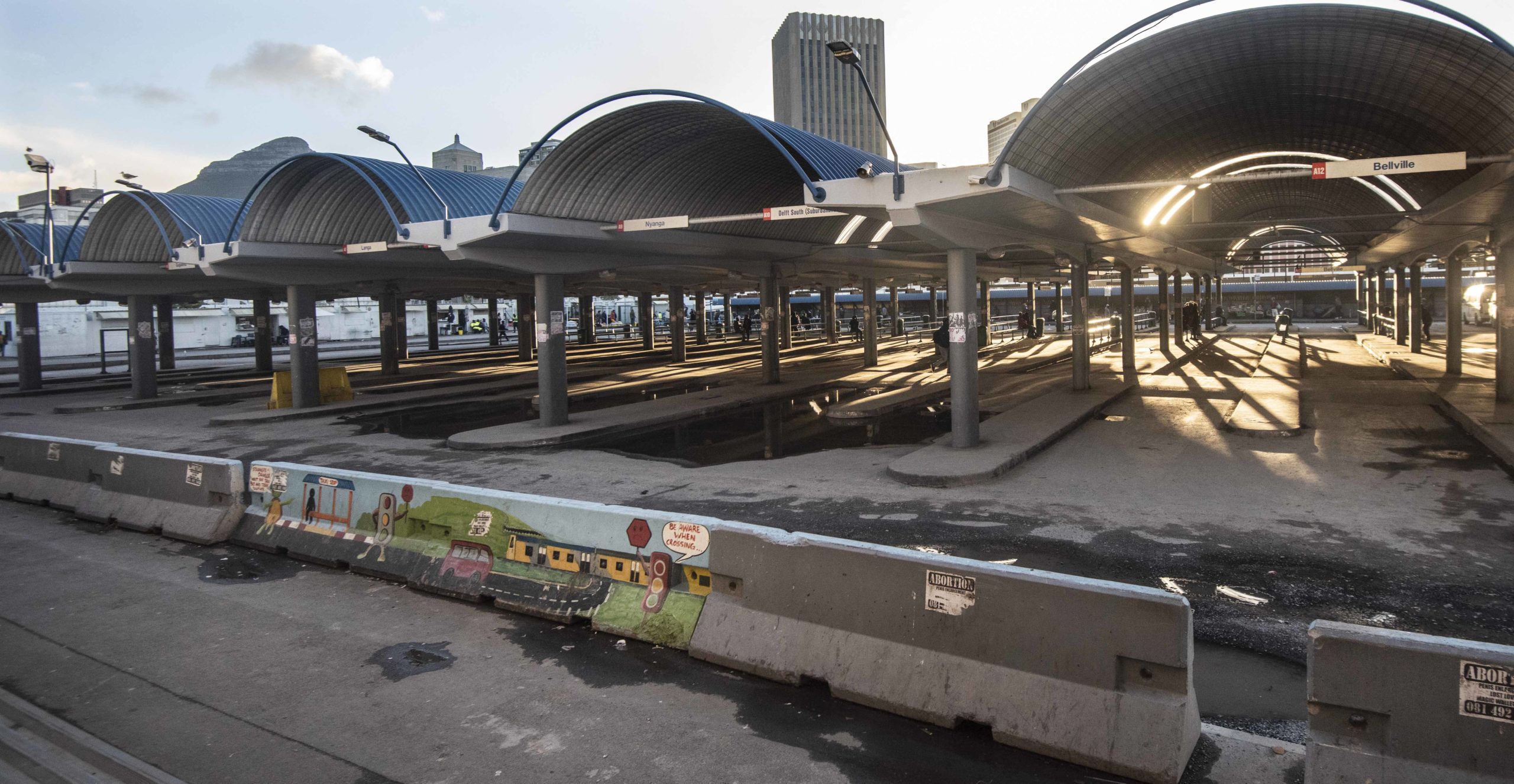
The empty Cape Town taxi rank, where some taxis have stopped their operations due to the current violence. (Photo: Brenton Geach)
Winde highlighted that it could not be allowed that 100,000 people were unable to use buses safely. To alleviate this, Winde had had talks with Richard Walker, regional manager of the Passenger Rail Agency of South Africa (Prasa) in the Western Cape, to get trains up and running.
But to get the rail system and the buses back into full operation it was important to create a safe environment in which these transport modes could operate, he said. Winde, after engagement with Patekile, officially requested that the South African National Defence Force (SANDF) be bolstered with further boots on the ground to assist the SA Police Service (SAPS) in their response to the ongoing taxi violence.
“We cannot allow a group of thugs to continue to threaten the lives of our residents and to commit what is a clear act of economic sabotage by preventing people from getting to work. We will not stand for it.”
Winde explained other measures the DTPW had taken to resolve the ongoing dispute between Cata and Codeta, which included the publishing of a notice in terms of Section 91 of the National Land Transport Act allowing MEC Mitchell to close routes and ranks in consultation with the SAPS.
“The DTPW is exploring approaching the Western Cape High Court to empower MEC Mitchell to place Santaco associations under administration. We are preparing to approach the High Court seeking a declaratory order that [eg, Cata and Codeta] are, like Santaco Western Cape, confined to specific geographic areas.”
Winde said space would be provided for taxi associations to find a lasting resolution, including through the provision of independent mediators.
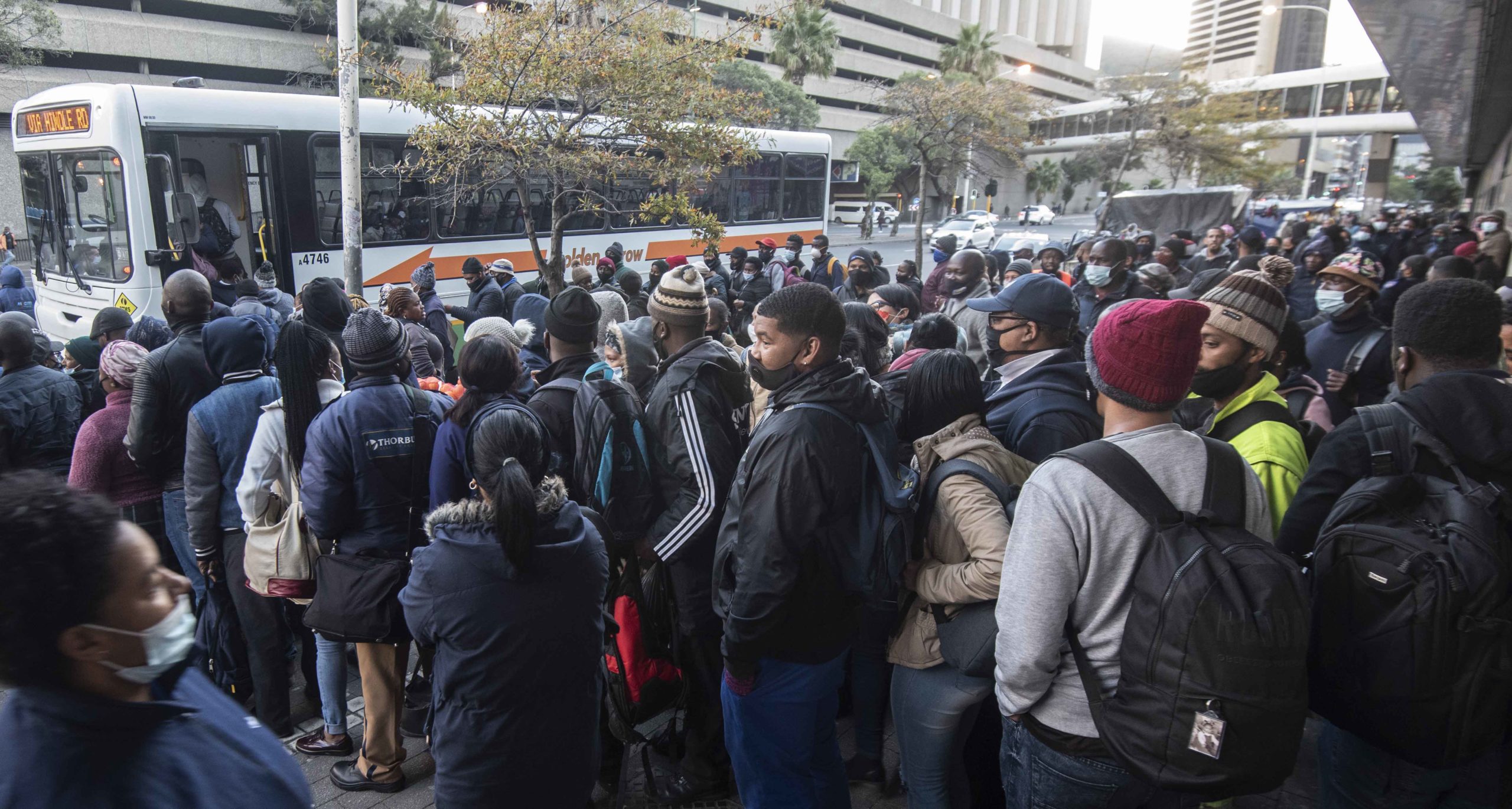
Commuters waiting in the Cape Town CBD for a bus home as the ongoing taxi violence forces them to seek alternative transport. (Photo: Brenton Geach)
“But I must be clear that the status quo is unacceptable and we will not sit by while the criminal conduct of a few undermines the entire taxi industry and indeed our local economy,” said the premier.
Fritz described those behind the taxi violence as a group of terrorists, who are worse than gangsters.
Patekile said the SAPS had forwarded WhatsApp messages containing threats to private operators and Uber drivers to intelligence for analysis to pinpoint the original senders.
“At our roadblocks whether [or not] a taxi driver has a valid gun licence for his firearm, it will be confiscated. Twelve people have been arrested and 40 firearms confiscated in the metro. It tells us that this is from Cata and Codeta.
“The firearms were sent to ballistics to determine if they were used in the taxi violence killings,” Patekile said.
Mitchell reiterated his disappointment that despite weeks of negotiations no amicable solution had been reached between conflicting taxi organisations.
“We cannot allow people to be killed. But I will do everything in my power to keep the community safe and therefore a collaboration approach is crucial.”
On the impact the taxi violence has on the economy, Moolman said it was “ludicrous for some in the Cape Town taxi industry to use violence against their competitors”.
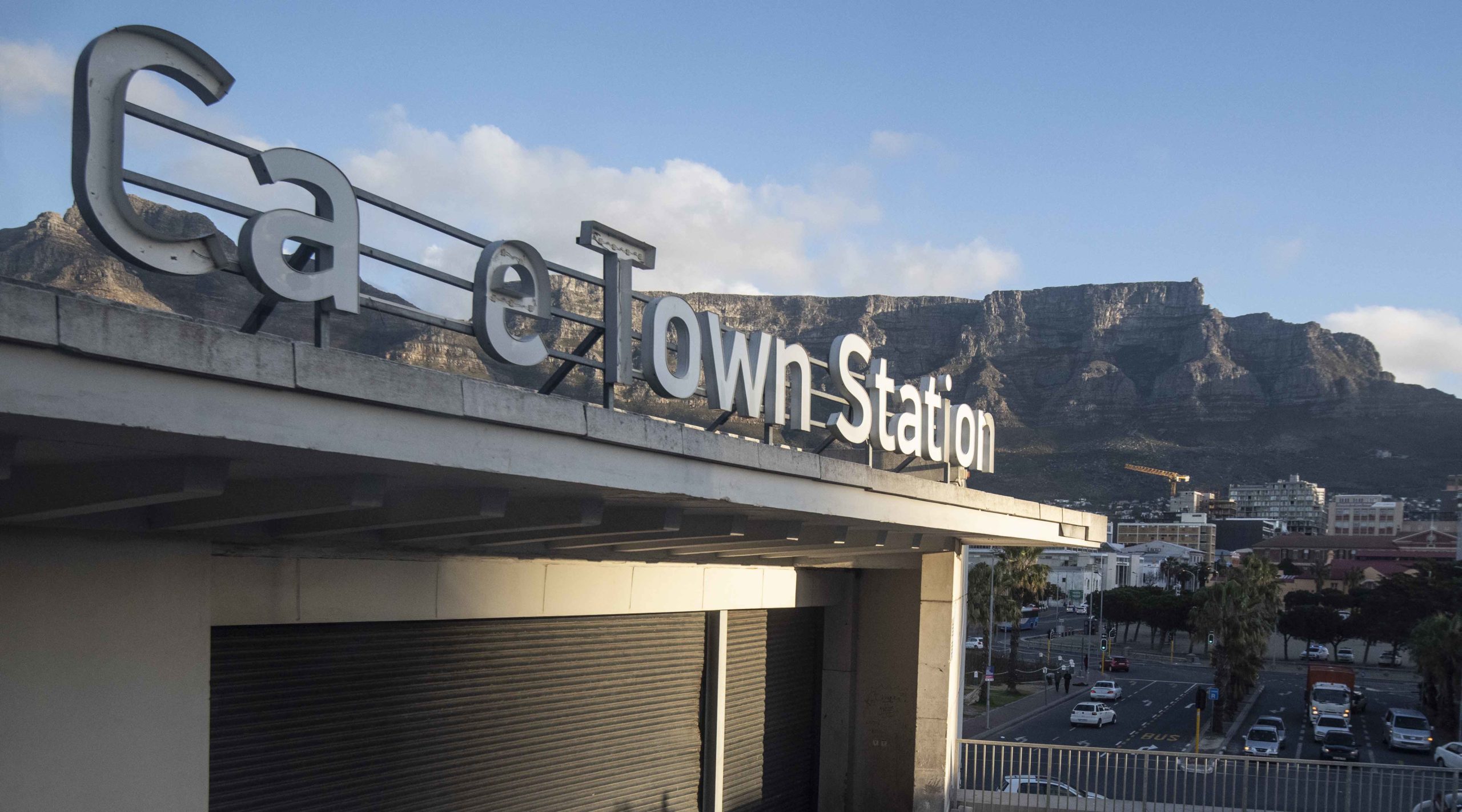
A view of Cape Town’s public transport interchange where commuters have been left stranded due to the ongoing taxi violence. (Photo: Brenton Geach)
Not only did this scare off potential paying passengers, it also created a vicious cycle which negatively affected the entire city economy – not least the taxi sector itself.
“Efficient, affordable and safe public transport is essential for any economy. Cape Town’s taxi industry plays a crucial role, especially since the railways have been appallingly mismanaged.
“Lack of transport means no freedom of movement. This prevents people getting to and from work. It affects production, profitability, business closure, job losses, tax collection, local government welfare programmes – like a ripple in a pond.”
The costs are almost incalculable, he said, adding a solution had to be found urgently, “not least in the interest of the taxi industry itself”.
Townships have been the worst affected by the taxi violence and the Cape Metro Development Council (CMDC), representing more than 25 development forums, has called on the waring taxi associations to silence their guns for the sake of the lives of residents and especially children
Ndithini Tyhido, convenor of the CMDC said: “As a structure we firmly believe that only hired guns (inkabi) benefit from the ongoing mayhem and violence. Genuine taxi operators and business people can only benefit from a taxi business run in an environment of peace and stability.”
The CMDC has called on the two taxi associations to cooperate with the local development forums in Khayelitsha, Nyanga, Gugulethu, Langa and Philippi in their meetings which are planned to take place Wednesday.

Commuters in Cape Town have been hit with limited public transport options due to ongoing taxi violence, limited buses and limited trains. (Photo: Brenton Geach)
“As the CMDC we give the two taxi associations, Cata and Codeta, until Friday, 23 July at 2pm to denounce all acts of violence and commit themselves to a mutually beneficial, meaningful and genuine negotiated settlement or face 90 days of full-on taxi boycott,” Tyhido said.
Fransina Lukas, spokesperson for the Khayelitsha Community Policing Forum (CPF), said communities in the townships are living in fear and seriously inconvenienced by the ongoing violence.
“People in Khayelitsha, Nyanga and other townships were not able to go to work. But it is the mothers selling sweets, chips and fruit along the streets that were the most affected.
“Commuters are the informal traders’ main support base. The money they generate is used to put food on the table. So with no commuters on the streets these mothers are denied making a quick buck,” Lukas said.
Pastor Charles George from the Delft CPF said the taxi violence had come at a terrible time. “Facing a pandemic, not only are we in lockdown Level 4, but people need to put food on the table.”
He said the attitude of most businesses was “no work, no pay”, adding they had listened to voice notes from employers telling employees to make sure they get to work, saying they don’t care if the employees get shot.
“Taxi violence is going to have a very negative impact on our community. People walk home. They put their lives at risk. They walk home in the dark, they queue from 3.30am to see if taxis are available.
“It is so tough on businesses to operate in this environment. I will be very surprised if these businesses survive this as well. Our feeding lines are on the increase because people can’t travel to work, which means they can earn a day’s wages, and that impacts on our social programmes as well,” he said.
The City of Cape Town Mayoral Committee Member for Safety and Security, JP Smith, said enforcement services continued to work closely with the SAPS and other role-players to mitigate the threat of violence.
Apart from the five arrests made pertaining to the violence and the recovery of firearms, Smith said: “Our traffic services have confiscated 44 taxis for operating illegally or in contravention of their operating permits in the last week.”
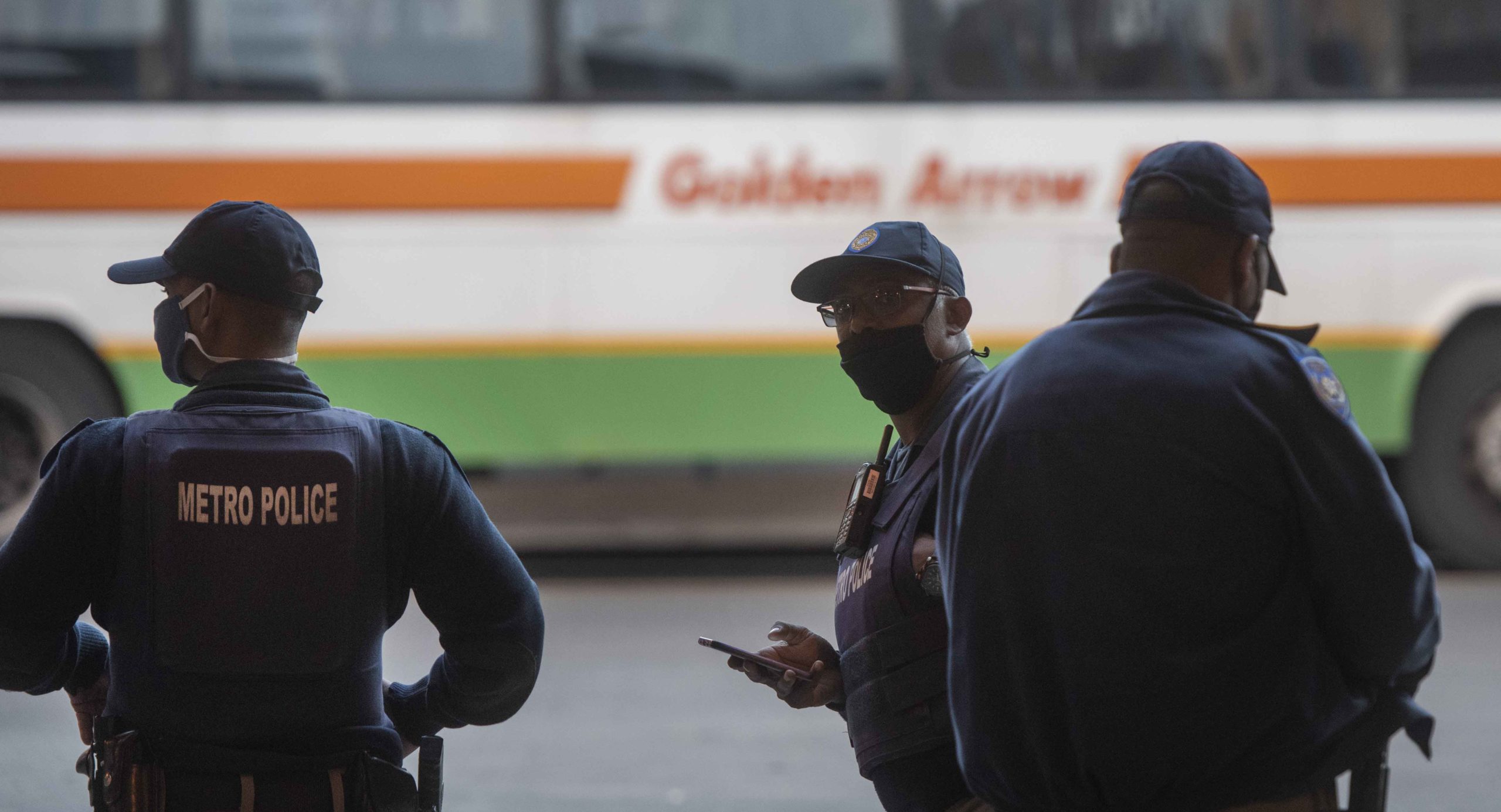
Law enforcement officials from the City of Cape Town monitor commuters at the Cape Town Station during peak hour on Tuesday, 20 July, amid ongoing taxi violence. (Photo: Brenton Geach)
Bronwen Dyke-Beyer, spokesperson for Golden Arrow Bus Services, said the company transported about 250,000 passengers per day.
“So far we are operating at about 40%; that means that approximately 100,000 of our passengers will be affected. Then you have to add in the passengers who would have used other modes usually but would have relied on us under the circumstances.
“We are working very closely with law enforcement and we hope that the situation will stabilise so that we can return to full operations. Unfortunately, at this stage we do not have an accurate timeline to share with regards to resumption of full services,” Dyke-Bryer said.
Meanwhile, police spokesperson Captain FC van Wyk confirmed a shooting incident had occurred on Tuesday at around 4.30am in Mnga Street, Witsand, Atlantis. A 42-year-old man was shot and injured.
“According to reports, the victim got out of his house to start the vehicle when unknown males shot at him. He ran in the house. He sustained gunshot wounds to his chest and both legs. He was transported to a nearby hospital for medical treatment.”
The suspects fled the scene and are still at large. The motive, Van Wyk said, could be related to taxi violence. He added that additional uniformed officers had been deployed to bring stability to a volatile situation in the area.
By 5pm on Tuesday afternoon, there weren’t as many people at the Cape Town Public Transport Interchange as seen on Monday’s viral images of crowds waiting for transport. The train station was empty, with few commuters using the concourse area as a thoroughfare to get to the taxi and bus station.
The top deck, where taxis usually load passengers, was unusually quiet. A few taxis were operational and even fewer commuters were making their way to the taxi rank. A group of taxi drivers who operate on the Dunoon (Milnerton) route, said the ongoing violence had not affected them and they could continue working.
There were no taxis in the allocated bays for Delft, Philippi, Khayelitsha, Nyanga and Gugulethu.
On the other side, hawkers were waiting for commuters to buy their goods. The loss of commuters means a loss of income. Brothers James and John Ncube, who sell fruits and vegetables, said their profits have been reduced by the violence. In pre-Covid times, they used to make R2,000 a day. Under the current Covid-19 conditions, the brothers make between R400 and R500 per day.
“Now I’ve been here… nothing, I’m struggling to get to R300,” said John Ncube.
“Right now, I’m actually stressing about rent, food on the table, especially rent, because next week is the end of the month,” said the father of three. “Most of our customers, they are the ones that taxi.”
Another hawker, Noluthando Kasa, who sells fruits, vegetables and sweets, said: “This week I think I’ve made R120.” Before Covid-19 she made R4,000 a week. Now, she takes home around R 2,000 if she is lucky. “If there’s taxis, there’s a lot of customers but now, there’s no taxis,” she said.
At another section of the transit area, about 100 people were waiting for two buses – an Electric City (Eerste River) and Eindhoven (Delft) bus. When one of the buses stopped, a large group wanted to get on it. Law enforcement officials were on board to ensure social distancing.
Two commuters, Janine Jacobs and Janine Stevens, questioned if the Eindhoven bus would go past Bishop Lavis where they live.
“There’s no taxis,” said Jacobs. Usually the two women take a taxi from town to Elsies River and then another to Bishop Lavis.
Jacobs said that after waiting since 5am for a bus out of Bishop Lavis to the Cape Town CBD she finally managed to get a bus at 6.10am.
Anyone with information about taxi violence is requested to contact Crime Stop on 08600 10111. DM/MC

















 Become an Insider
Become an Insider
The taxi industry is the original form of state capture. Taxi’s represent the only viable form of public transport, as there is no alternative. Taxi drivers took over the roads, ignoring the law and driving exactly as and where they like. Traffic police is ignored and the industry is untouchable. Attempts to regularize their activities are met with not only taxi strikes, but intimidation of the public and attacks on other forms of transport.
The government has for years never attempted to do anything to resolve this. The public suffers and the kingpins make billions.
This is how state capture started; creating the culture of impunity.
The Taxi industry has enough power to shut down the country. We need to ask ourselves if that’s a good place to find ourselves. Something needs to be done urgently. cANCer need to address public transport and Transnet as a matter of urgency. But Mr Fixit does squat! #VoetsekANC